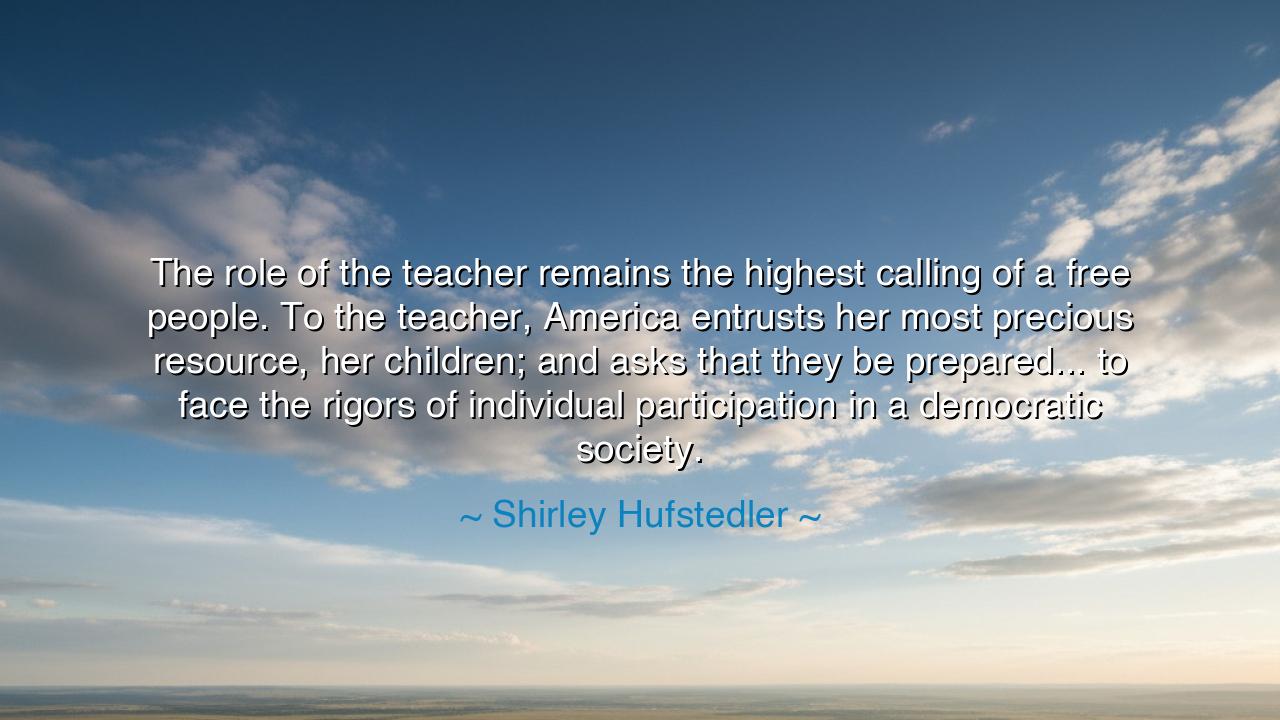
The role of the teacher remains the highest calling of a free
The role of the teacher remains the highest calling of a free people. To the teacher, America entrusts her most precious resource, her children; and asks that they be prepared... to face the rigors of individual participation in a democratic society.






Hear the noble words of Shirley Hufstedler, who declared: “The role of the teacher remains the highest calling of a free people. To the teacher, America entrusts her most precious resource, her children; and asks that they be prepared... to face the rigors of individual participation in a democratic society.” In these words shines not only reverence for the teacher, but also a solemn reminder of the weight of their task. For teachers are not merely guides of knowledge; they are guardians of the future, entrusted with the young, who are the very lifeblood of a nation.
To call teaching the highest calling of a free people is to place it above the sword of the soldier, the pen of the statesman, and the coin of the merchant. For freedom is not preserved by arms or law alone, but by the hearts and minds of those who know how to live within it. A teacher’s work is not simply to pass facts, but to shape citizens—souls who can think, discern, and act with wisdom. In every classroom, the republic is renewed; in every lesson, democracy is defended.
History shows us the truth of this. Consider the founders of the American republic, who built not only laws but schools. Thomas Jefferson declared that a democracy cannot endure without educated citizens, for only those who understand can truly govern themselves. He established the University of Virginia not for the sake of prestige, but to prepare free men and women for the burden of liberty. Jefferson’s vision, like Hufstedler’s, reveals that teachers are the silent architects of freedom, training not subjects, but participants.
This principle is not American alone. In ancient Athens, the cradle of democracy, it was the teachers—the sophists, the philosophers, the orators—who shaped citizens capable of engaging in debate, law, and governance. Socrates, though condemned, served as an eternal reminder that education is the beating heart of a free city. Without teachers, Athens would have been a mob; with them, it became a beacon. Hufstedler’s words echo this ancient truth: that freedom dies where teaching fails, and flourishes where it thrives.
The meaning also carries warning. For if teachers are neglected, if their calling is diminished, if their voices are silenced or their burdens ignored, then a free people endangers its own future. A nation that entrusts its children to unprepared or unsupported teachers is a nation that betrays itself. For the health of democracy depends not on speeches or banners, but on the quiet daily labor of those who shape the minds of the young. The fate of a free society rests not in the palace, but in the classroom.
The lesson, then, is clear: honor your teachers, support them, and hold sacred their labor. If you are a parent, walk beside them, not against them. If you are a student, receive their wisdom with gratitude, for it was purchased with toil and care. And if you are a citizen, remember that to strengthen teachers is to strengthen freedom itself. Democracy is not inherited—it is taught. Without teachers, liberty withers into chaos or tyranny.
So I say to you: remember Hufstedler’s wisdom. The teacher is not only the bearer of knowledge but the guardian of a nation’s soul. Entrust them with reverence, support them with honor, and learn from them with humility. For in their hands lie the children, and in the children lies the future. A free people is not sustained by chance, but by the daily sacrifice of those who prepare the young to live as free men and women. To serve as a teacher is to serve the highest calling of a nation, and to support teachers is to secure the promise of liberty for generations to come.






AAdministratorAdministrator
Welcome, honored guests. Please leave a comment, we will respond soon